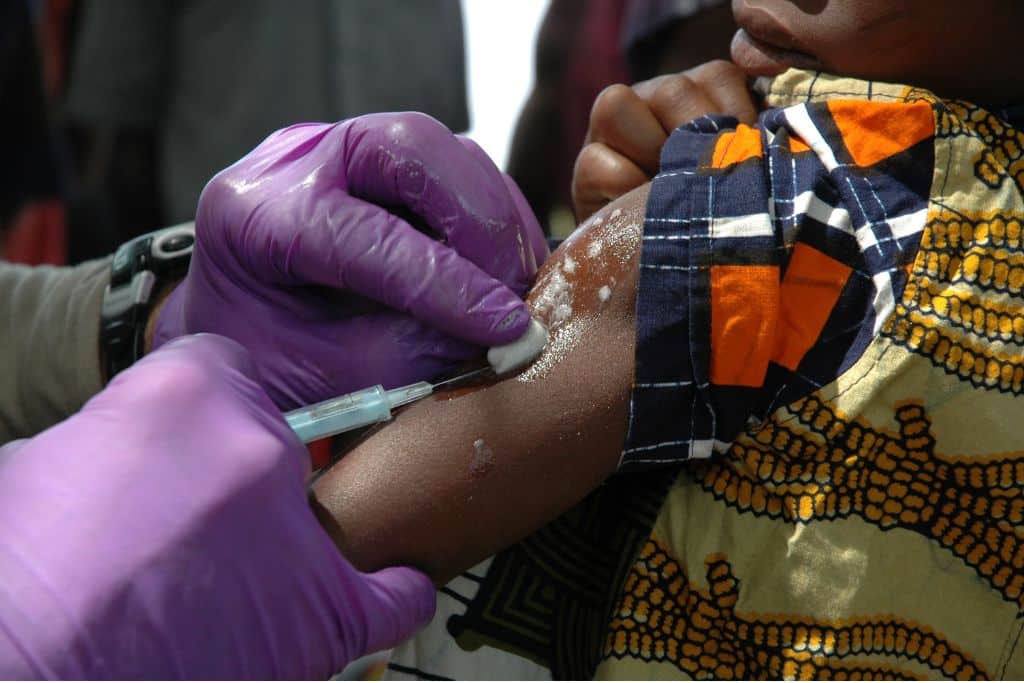Malaria, a preventable disease transmitted by mosquitoes, killed 608,000 people in 2022, mostly in Africa.
—
The world’s first mass vaccination campaign against malaria kicked off in Cameroon on Monday, marking a huge milestone in the fight against the deadly tropical disease.
Nearly 30 million jabs developed by British pharmaceutical company GSK will be distributed in up to 12 countries across sub-Saharan Africa as part of a World Health Organization-backed campaign to stop the spread of the disease, which in 2022 infected 249 million people – 16 million more than in 2019 – and claimed 608,000 lives, 95% of them in Africa.
Children are particularly vulnerable to malaria, a preventable disease caused by parasites transmitted by mosquitoes, with the UN International Children’s Emergency Fund (UNICEF) estimating that in Africa, a child under the age of five dies of malaria nearly every minute.
More than 30 years in the making, the RTS,S vaccine has already been rolled out to nearly 2 million children in Ghana, Kenya, and Malawi as part of a promising pilot program that has shown a 30% reduction in deadly symptoms. It is now poised for a broader rollout across the continent, which bears the world’s biggest burden, with Cameroon leading the way. The Central African country is among the ones most affected by the disease globally, with 3 million cases and nearly 4,000 deaths recorded in 2021.
A second vaccine developed by scientists at Oxford university and produced by India’s Serum Institute, which completed a key regulatory step in December, will be rolled out in the coming months, easing fears of a supply squeeze after more than 30 African nations expressed interest in the vaccine.
“Having two vaccines for malaria will help to close the huge gap between demand and supply and could save tens of thousands of young lives, especially in Africa,” said Tedros Adhanom Ghebreyesus, WHO Director-General, at a meeting of the UN body’s executive board on Monday.
Dr. Phanuel Habimana, WHO Representative in Cameroon, called the campaign a “significant step in the prevention and control of the disease, especially in protecting children against severe disease and death,” adding that the UN agency is “committed to supporting the national health authorities to ensure an effective rollout of the malaria vaccine together with scale up of other malaria control measures.”
Several news agencies reporting from Cameroon highlighted a noticeable lack of engagement and overall turnout on the initial day of the critical campaign, with some health workers arguing that parents were not adequately informed about the vaccine, though local authorities assured they remain committed to intensifying their education and awareness efforts.
Cases Rising
According to the UN 2023 World Malaria Report, the recent spike in cases is linked to disruptions caused by the Covid-19 pandemic as well as drug and insecticide resistance, widespread humanitarian crises, resource constraints, and delays in program implementation, particularly in hard-hit countries. But among all this, one factor is blamed for facilitating and accelerating the spread of malaria and other diseases: global warming.
Changes in temperatures, humidity, and rainfall affect the behaviour of malaria-carrying Anopheles mosquitoes. Moreover, extreme weather events pose additional health risks to affected communities. For instance, severe storms can contaminate water sources and spread diseases like diarrhoea, cholera, and Legionnaires disease. Both scenarios can lead to disastrous outbreaks, such as the one witnessed in Pakistan following deadly floods in 2022, where polluted stagnating waters provided ample opportunity for mosquitoes to breed. The country, which had been making steady progress against the disease, saw at least a four-fold increase in the reported number of malaria cases after the floods, from 400,000 cases nationwide in 2021 to more than 1.6 million cases in 2022, according to UN figures.
“The changing climate poses a substantial risk to progress against malaria, particularly in vulnerable regions. Sustainable and resilient malaria responses are needed now more than ever, coupled with urgent actions to slow the pace of global warming and reduce its effects,” said Tedros.
Not Just Malaria
Warmer weather lengthens the life spans of mosquitoes and other insects that carry deadly diseases like dengue, malaria, and Zika.
Bangladesh is currently battling its worst-ever outbreak of dengue fever, another viral infection that spreads from mosquitoes to people. Similar to malaria, dengue is more common in tropical and subtropical climates, with Asia accounting for almost 70% of global cases.
In July 2023, the Head of the Global Programme on Control of Neglected Tropical Diseases of the World Health Organization (WHO), Dr Raman Velayudhan, warned that global warming could prompt a record number of dengue infections worldwide, with approximately half of the world’s population at risk of contracting the virus.
Experts blame the spike on higher temperatures and precipitations which, combined with numerous other factors including the increased movement of people and goods and pressure on water and sanitation systems, create the perfect environment for mosquitos to thrive and multiply faster.
“[B]oth during a flood situation as well as a drought situation, dengue can increase. The virus and the vector multiply faster at a higher temperature,” explained Velayudhan.
Between 2000 and 2022, reported cases went up eightfold, reaching 4.2 million last year after hitting an all-time high in 2019 with 5.2 million cases in 129 countries. As “the world’s fastest-spreading tropical disease,” the UN organisation warned that dengue now represents a “pandemic threat.”
More on the topic: What’s the Link Between Climate Change and Disease Outbreaks?


















